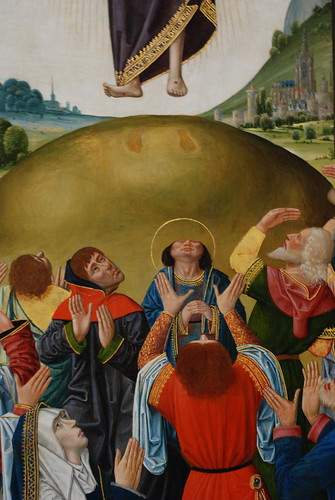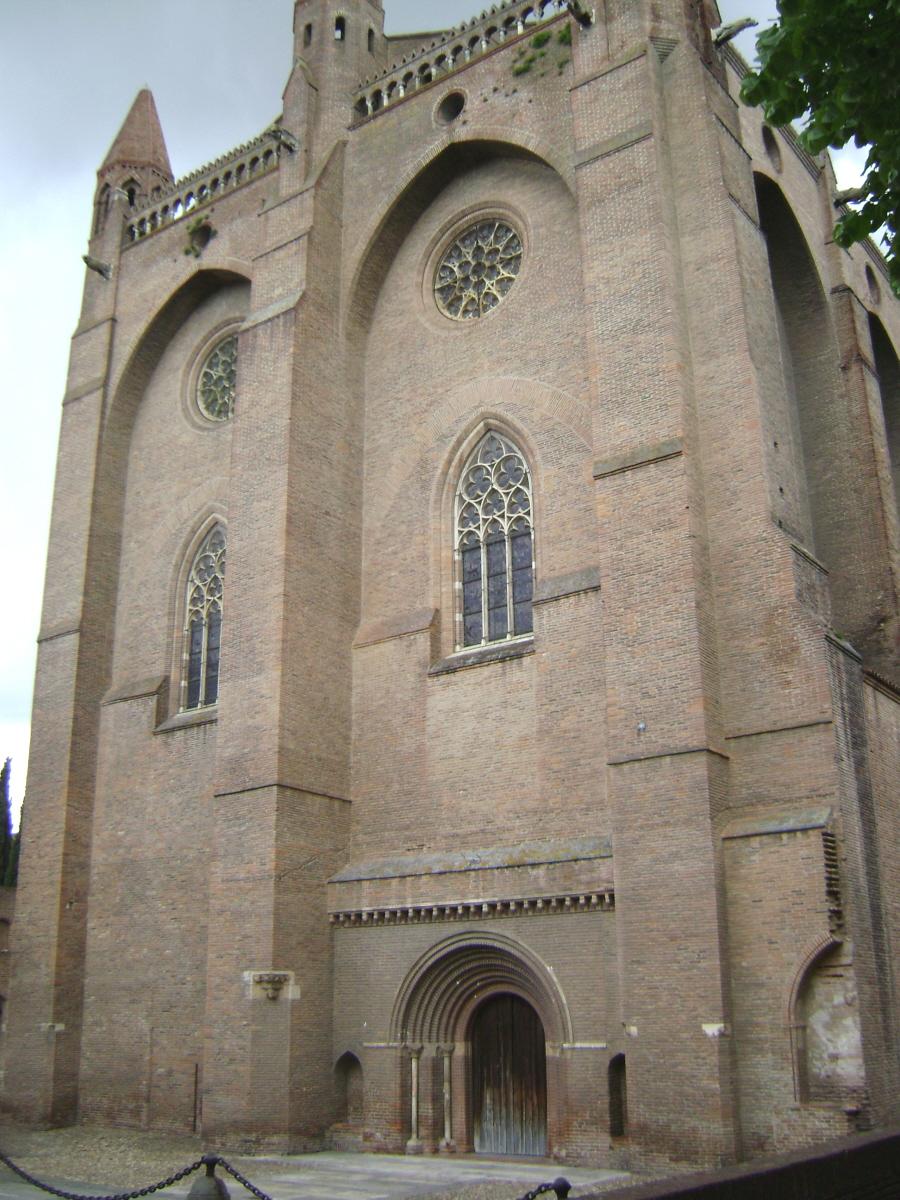|
Absolutio: Ipsíus píetas et misericórdia nos ádjuvet, qui cum Patre et Spíritu Sancto vivit et regnat in sæcula sæculórum.
R. Amen. | Absolution: May his loving-kindness and mercy assist us. Who, with the Father, and the Holy Ghost, liveth and reigneth, for ever and ever.
R. Amen. |
V. Jube domne, (Dómine) benedícere. | V. Vouchsafe, Reverend Father (O Lord), thy blessing. |
Benedíctio 4: Deus Pater omnípotens sit nobis propítius et clemens.
R. Amen. | Benediction 4: May God the Father Almighty shew us his mercy and pity.
R. Amen. |
| Lesson iv |
 |
Joánnes Antiochénus, propter áureum eloquéntiæflumen cognoménto Chrysóstomus, a forénsibus et sæculáribus stúdiis ad divínas lítteras summa cum ingénii et indústriæ laude se cóntulit. Itaque sacris initiátus ac présbyter Antiochénæ ecclésiæ factus, mórtuo Nectário, Arcádii imperatóris ópera, invítus Constantinopolitánæ ecclésiæ præfícitur. Quo suscépto pastoráli múnere, depravátos mores, et nobiliórum hóminum vivéndi licéntiam veheméntius objurgáre cœpit : qua ex libertáte magnam multórum súbiit invídiam. Apud Eudóxiam étiam, quod eam propter Callítropæ víduæ pecúniam, et altérius víduæ agrum reprehendísset, gráviter offéndit. | John of Antioch, who, on account of the golden stream of his eloquence, is called by the Greeks Chrysostomos, or, The golden-mouthed, was a lawyer and man of the world of much eminence, before he turned his great intellect and wonderful industry to the study of things sacred. He took orders, and was ordained a priest of the Church of Antioch, and after the death of Nectarius, was forced by the Emperor Arcadius to accept, though sorely against his own will, the Archbishoprick of Constantinople. Having received the burden of a shepherd's office, in the year 398, he set himself zealously to do his duty, struggling against the degradation of public morality and the loose lives of the nobility, and thereby drew upon himself the ill-will of many enemies, especially the Empress Eudoxia, whom he had rebuked on account of the money of the widow Callitropa, and the land of another widow. |
V. Tu autem, Dómine, miserére nobis.
R. Deo grátias. | V. But thou, O Lord, have mercy upon us.
R. Thanks be to God. |
 |
R. Invéni David servum meum, óleo sancto meo unxi eum : * Manus enim mea auxiliábitur ei.
V. Nihil profíciet inimícus in eo, et fílius iniquitátis non nocébit ei.
R. Manus enim mea auxiliábitur ei. | R. I have found David my servant, with my holy oil have I anointed him. * My hand shall hold him fast.
V. The enemy shall not be able to do him violence ; the son of wickedness shall not hurt him.
R. My hand shall hold him fast. |
|
V. Jube domne, (Dómine) benedícere. | V. Vouchsafe, Reverend Father (O Lord), thy blessing. |
Benedíctio 5: Christus perpétuæ det nobis gáudia vitæ.
R. Amen. | Benediction 5: May Christ bestow upon us the joys of life eternal.
R. Amen. |
| Lesson v |

Church of the Eternal Wisdom (St. Sophia), Constantinople (Istanbul) |
Quare áliquot episcopórum acto Chalcédone convéntu, quo ipse vocátus ire nóluit, quod nec legítimum concílium nec públicum esse díceret, niténte in primis ipsa contra Chrysóstomum Eudóxia, ejícitur in exsílium : sed paulo post propter ejus desidérium seditióne pópuli facta, admirábili civitátis plausu ab exsílio revocátur. Verum cum pérditos mores increpáre non desísteret, et ad argénteam Eudóxiæ státuam in foro sanctæ Sophíæ ludos fíeri prohibéret ; conspiratióne inimicórum episcopórum íterum exsuláre cógitur, víduis et egéntibus ómnibus commúnis paréntis ejectiónem lugéntibus. In exsílio Chrysóstomus incredíbile est et quanta mala perpéssus sit, et quam multos ad Jesu Christi fidem convérterit. | Some bishops being assembled in a Council at Chalcedon, which Council the Saint held to be neither lawful, nor public, although he was commanded to go there, he refused. Whereupon Eudoxia, striving earnestly against him, caused him to be sent into exile. Soon after, however, the people of the city rose, and demanded his recall, and he was then brought back again amid great public rejoicings. Nevertheless he ceased not to war against vice, and absolutely forbade the celebration of public games round the silver statue of Eudoxia in the square outside the Church of the Eternal Wisdom. Upon this, a party of bishops, who were enemies to him, banded together, and obtained that he should be banished again, which was done accordingly, amid the lamentations of widows and the poor, who felt as if they were being deprived of a common father. During this exile, it almost passeth belief how much Chrysostom suffered, and how many souls he turned to the faith which is in Christ Jesus. |
V. Tu autem, Dómine, miserére nobis.
R. Deo grátias. | V. But thou, O Lord, have mercy upon us.
R. Thanks be to God. |
 |
R. Pósui adjutórium super poténtem, et exaltávi eléctum de plebe mea : * Manus enim mea auxiliábitur ei.
V. Invéni David servum meum, óleo sancto meo unxi eum.
R. Manus enim mea auxiliábitur ei. | R. I have laid help upon one that is mighty, I have exalted one chosen out of the people. * My hand shall hold him fast.
V. I have found David, my servant, with my holy oil have I anointed him.
R. My hand shall hold him fast. |
|
V. Jube domne, (Dómine) benedícere. | V. Vouchsafe, Reverend Father (O Lord), thy blessing. |
Benedíctio 6: Ignem sui amóris accéndat Deus in córdibus nostris.
R. Amen. | Benediction 6: May God enkindle in our hearts the fire of his holy love.
R. Amen. |
| Lesson vi |
 |
Verum dum, concílio Romæ hábito, decréto Innocéntii primi Pontíficis restitúitur, a milítibus, qui eum custodiébant, miris in itínere malis et calamitátibus affícitur. Cumque per Arméniam ducerétur, sanctus Basilíscus Martyr, in cujus templo ántea oráverat, noctu sic eum affátus est : Joánnes frater, crástinus dies nos loco conjúnget. Quare postrídie sumpto Eucharístiæ sacraménto seque crucis signo múniens, ánimam Deo réddidit, décimo octávo Kaléndas Octóbris. Quo mórtuo, horríbilis grando Constantinópoli cécidit, et quatríduo Augústa cessit e vita. Ejus corpus insígni pompa et hóminum multitúdine celebrátum, Theodósius Arcádii fílius Constantinópolim portándum, et honorífice sepeliéndum curávit sexto Kaléndas Februárii : cujus étiam relíquias venerátus, paréntum suórum véniam pétiit : quod deínde Romam translátum in basílica Vaticána cónditum est. Multitúdinem, pietátem, ac splendórem conciónum ceterorúmque ejus scriptórum, interpretándi étiam ratiónem, et inhæréntem senténtiæ sacrórum librórum explanatiónem omnes admirántur ; dignúmque exístimant, cui Paulus Apóstolus, quem ille mirífice cóluit, scribénti et prædicánti multa dictásse videátur. Hunc vero præclaríssimum univérsæ Ecclésiæ Doctórem Pius décimus Póntifex máximus cæléstem oratórum sacrórum patrónum declarávit atque constítuit. | At this time a Council was assembled at Rome, wherein Chrysostom's restoration to his See was decreed by Pope Innocent I, but meanwhile, he was suffering great hardships and cruelties on his journey at the hands of the soldiers who had him in charge. As he passed through Armenia he prayed in the Church of the holy martyr Basiliscus, and the same night that blessed conqueror appeared to him in a vision and said : Brother John, tomorrow thou shalt be with me. On the next day, therefore, he received the Sacrament of the Eucharist, and, arming himself with the sign of the Cross, resigned his soul to God, it being the 14th of September. As soon as he was dead a furious hailstorm took place at Constantinople, and after four days the Empress died. The Emperor Theodosius, the son of Arcadius, brought the body of John Chrysostom to Constantinople with great state, and numerously attended, and on the 27th of January, laid it with magnificent honours in the grave, beside which he prayed for the forgiveness of his own father and mother. The holy body was afterwards taken to Rome, and is now buried in the Vatican Basilica. The number, devoutness, and brilliance of St. John Chrysostom's sermons and other writings, his acuteness in exposition, and the close aptness of his explanations of Holy Scripture, have been and are the object of universal wonder and admiration, and often seem not unworthy to have been dictated to him by the Apostle Paul, for whom he entertained a wonderful devotion. This most outstanding Doctor of the Church universal was proclaimed and appointed the heavenly patron of sacred orators by the Supreme Pontiff, Pius X. |
V. Tu autem, Dómine, miserére nobis.
R. Deo grátias. | V. But thou, O Lord, have mercy upon us.
R. Thanks be to God. |
|
R. Iste est, qui ante Deum magnas virtútes operátus est, et omnis terra doctrína ejus repléta est : * Ipse intercédat pro peccátis ómnium populórum.
V. Iste est, qui contémpsit vitam mundi, et pervénit ad cæléstia regna.
R. Ipse intercédat pro peccátis ómnium populórum.
V. Glória Patri, et Fílio, et Spirítui Sancto.
R. Ipse intercédat pro peccátis ómnium populórum. | R. This is he who wrought mighty deeds and valiant in the sight of God, and all the earth is filled with his doctrine: * May his intercession avail for the sins of all the people.
V. He was a man who despised the life of the world and attained unto the kingdom of heaven.
R. May his intercession avail for the sins of all the people.
V. Glory be to the Father, and to the Son, and to the Holy Ghost.
R. May his intercession avail for the sins of all the people. |







.jpg)





















